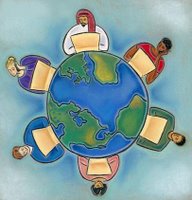Currently, we can share and learn from others in the so called Communities of Practice (Cops). I heard about it in the seminar I attended last February, ICT in ELT: putting the 'Learning' back into 'E-Learning' (2006) and I would like to share what I learned about it with you.
Well, a good start would be providing some definitions about CoPs. CoPs definitions Nicholson (2000): "Communities of Practice (CoPs) are groups of people in organizations that form to share what they know, to learn from one another regarding some aspects of their work and to provide a social context for that work."
Gavin Dudeney (2006)
 Gavin Dudeney, seminar event director, gave us some definitions related to communities of practice. He referred to two types of CoPs: physical and distributed ones. The former refers to “a group of people who share an interest in something, and come together to develop knowledge around this topic, in order to use it in practice.” (Wenger, 1991). The latter to “…a distributed community of practice (CoP) consists of a group of people who communicate with each other synchronously and/or asynchronously, concerning a topic of common interest.” (Jones, 2002).
Gavin Dudeney, seminar event director, gave us some definitions related to communities of practice. He referred to two types of CoPs: physical and distributed ones. The former refers to “a group of people who share an interest in something, and come together to develop knowledge around this topic, in order to use it in practice.” (Wenger, 1991). The latter to “…a distributed community of practice (CoP) consists of a group of people who communicate with each other synchronously and/or asynchronously, concerning a topic of common interest.” (Jones, 2002). 
The next definition is taken from Wenger’s site and I kind of like this one a lot: “Communities of practice are groups of people who share a concern or a passion for something they do and learn how to do it better as they interact regularly.”
These concepts have got in common words like “learn”, “share”, “interact”, “things in common”. I would dare to add that interactions in CoPs are done without the constraints and demands that formal contexts imposed on people and that generally prevent them from contributing authentic and valuable information. This information could enhance their practices which will have a direct impact in the environments they work in. In education, especially EFL in our country, are in need of being nurtured and seeded by the expertise of others. Universities seem to develop knowledge which stays at universities. Same thing seems to apply to state schools. The only moment we seemed to share is in few EFL events like TESOL. But then again knowledge gets there, we don’t know what happens afterwards. Do people apply what they learn in these events? If so, how? Is it any better? If they couldn’t, why? Can we help? Is it possible to start networks that keep EFL teachers in contact to share and end up producing something that gives coherence to our curriculums all along the country?
Characteristics of Cops Gavin Dudeney’s presentation during the seminar was not only restricted to definitions but to examples of CoPs like Webheads in action and some aspects that characterize these communities. Click on the word chart below to see these characteristics. In this CHART you will see:
1) Type of communication used among members
2) How CoPs are organized
3) The knowledge domain in this type of communities
4) What members do in CoPs
5) Approach CoPs is based on
6) Tool used to set up CoPs
7) Stages CoPs go thorough
If you want to learn more about Cops, I recommend you to go to:
Communities of Practice a brief introduction
A 1-page quick guide by Etienne Wenger
Communities of practice
Communities of practice
Stephen Powell’s blog
Facilitating and hosting virtual commnunities
Some considerations for facilitating online interaction
Communitiy members roles and types
Using content to support your commnuity
Building online communities for high-profile Internet sites
